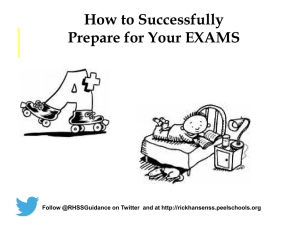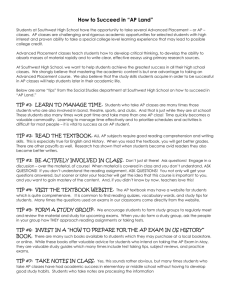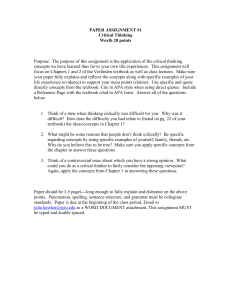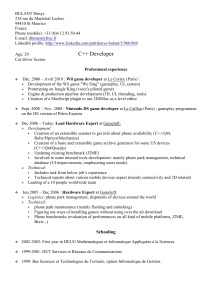2015.57.hyt develop study skills
advertisement
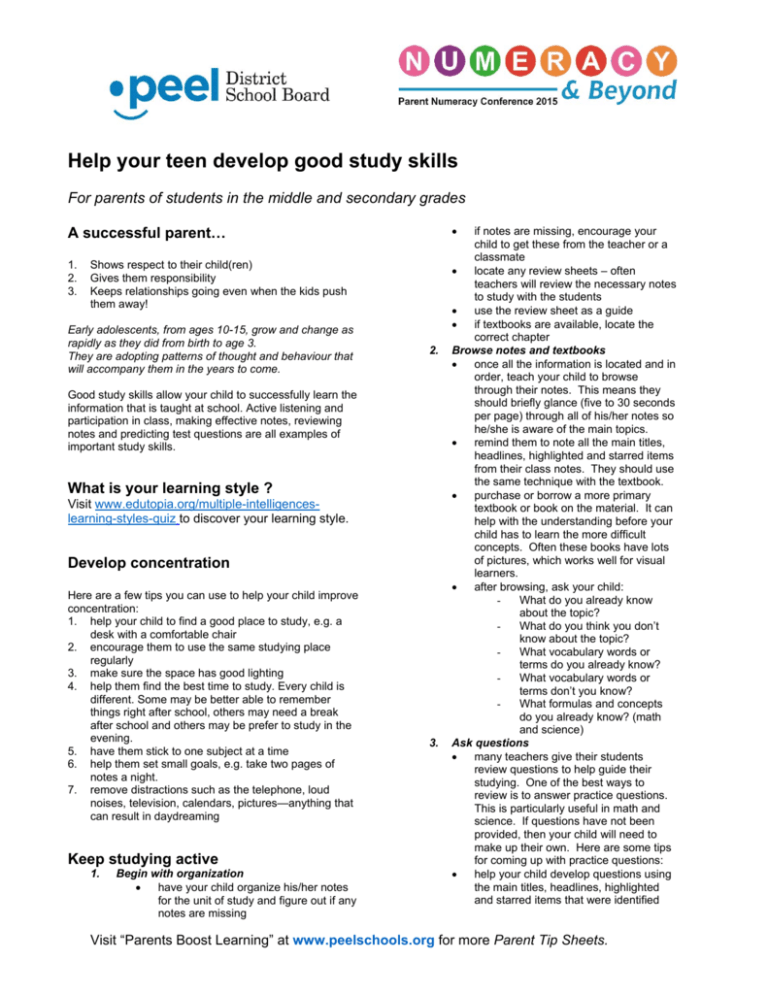
Help your teen develop good study skills For parents of students in the middle and secondary grades A successful parent… 1. 2. 3. Shows respect to their child(ren) Gives them responsibility Keeps relationships going even when the kids push them away! Early adolescents, from ages 10-15, grow and change as rapidly as they did from birth to age 3. They are adopting patterns of thought and behaviour that will accompany them in the years to come. 2. Good study skills allow your child to successfully learn the information that is taught at school. Active listening and participation in class, making effective notes, reviewing notes and predicting test questions are all examples of important study skills. What is your learning style ? Visit www.edutopia.org/multiple-intelligenceslearning-styles-quiz to discover your learning style. Develop concentration Here are a few tips you can use to help your child improve concentration: 1. help your child to find a good place to study, e.g. a desk with a comfortable chair 2. encourage them to use the same studying place regularly 3. make sure the space has good lighting 4. help them find the best time to study. Every child is different. Some may be better able to remember things right after school, others may need a break after school and others may be prefer to study in the evening. 5. have them stick to one subject at a time 6. help them set small goals, e.g. take two pages of notes a night. 7. remove distractions such as the telephone, loud noises, television, calendars, pictures—anything that can result in daydreaming Keep studying active 1. Begin with organization have your child organize his/her notes for the unit of study and figure out if any notes are missing 3. if notes are missing, encourage your child to get these from the teacher or a classmate locate any review sheets – often teachers will review the necessary notes to study with the students use the review sheet as a guide if textbooks are available, locate the correct chapter Browse notes and textbooks once all the information is located and in order, teach your child to browse through their notes. This means they should briefly glance (five to 30 seconds per page) through all of his/her notes so he/she is aware of the main topics. remind them to note all the main titles, headlines, highlighted and starred items from their class notes. They should use the same technique with the textbook. purchase or borrow a more primary textbook or book on the material. It can help with the understanding before your child has to learn the more difficult concepts. Often these books have lots of pictures, which works well for visual learners. after browsing, ask your child: What do you already know about the topic? What do you think you don’t know about the topic? What vocabulary words or terms do you already know? What vocabulary words or terms don’t you know? What formulas and concepts do you already know? (math and science) Ask questions many teachers give their students review questions to help guide their studying. One of the best ways to review is to answer practice questions. This is particularly useful in math and science. If questions have not been provided, then your child will need to make up their own. Here are some tips for coming up with practice questions: help your child develop questions using the main titles, headlines, highlighted and starred items that were identified Visit “Parents Boost Learning” at www.peelschools.org for more Parent Tip Sheets. when he/she browsed through the material use the visual picture or mental map to create questions use various question words such as why, what, who, how, where and when remember that questions generate more thinking than answers do, so be sure your child helps you develop them there are two types of information you should come up with questions for: main topics or content ideas words, vocabulary, ideas and their meanings be sure to take advantage of review or chapter questions in the textbook 4. Set goals help your child set goals as to how many questions they would like to work on in one sitting estimate the amount of time needed to accomplish their goal including breaks people need to take a short break every 30 minutes to refresh the mind setting lengthy or unrealistic goals with your child can lead to frustration – so keep it reasonable and keep your child’s attention span in mind 5. Gather answers students should begin to gather information to answer their study questions ideally, your child should read no more than a page without writing something down encourage them to summarize what he has read – not to copy it word for word responding to reading is the best way to remember it if your child has difficulty summarizing, have them tell you orally what they have just read before writing it down 6. Make it meaningful letting your child read simple books, newspaper articles or websites on the topic helps him/her grasp the more difficult concepts ask them to consider how they feel about what they have read, particularly in language arts, history and geography debate, argue or role play with your child to create greater understanding ask your child how things fit together talk about the reasons why your child is learning about certain topics or issues 7. Remember the information encourage your child to use some of these strategies to help boost study skills: practise answering questions without notes repeat and review the material over many days post sticky notes around the house with terms and vocabulary on them apply the ideas to real life, e.g. science with cooking, history to recent news stories, math to household expenses create a song, rhyme or rap to remember facts or dates make up a story about the material invite a study buddy to test or debate with them have them pretend to be the teacher and give you a lesson on what they have learned use acronyms or acrostics to remember orders or lists such as: HOMES – Huron, Ontario, Michigan, Erie, Superior (The Great Lakes) BEDMAS – brackets, exponents, division, multiplication, addition, subtraction (Algebra) Every Good Boy Deserves Fudge – EGBDF (lines on the treble clef in music) Tip sheet prepared by Katherine Sterne adapted by Karen Thomas and Stewart Mackie Workshop presented by Karen ThomasBlanchette, Vice Principal, Streetsville Secondary School and Stewart Mackie, Vice Principal, Robert H. Lagerquist Sr. Public School April 18, 2015 Visit “Parents Boost Learning” at www.peelschools.org for more Parent Tip Sheets.
